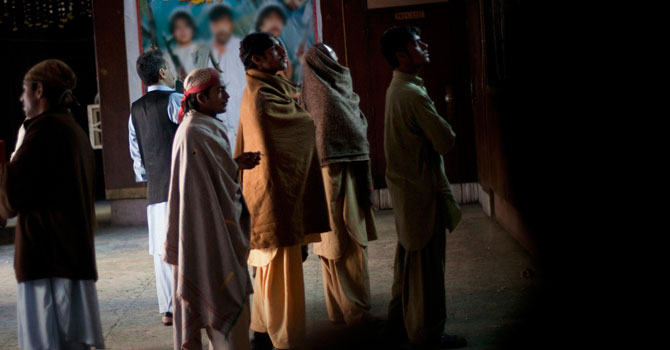
SRINAGAR: Even though Bollywood has returned to the Valley with movies like Rockstar and Jab Tak Hai Jaan, Kashmir’s own film industry still longs for life.
Marred by conflict and government negligence, Kashmir's film industry continues to fight for revival despite its glorious past.
Historically, movie making in Kashmir began way back in 1964. Manziraat (Henna ceremony) is known to be the first Kashmiri feature film. Released in the year 1964, the movie was directed by Jagjiram Pal. It was screened at a cinema hall in the main city of Kashmir, and evoked tremendous response from the people.
The film was rewarded with president’s award. The first documentary film made in Kashmir was Pamposh (Lotus) made by Ezra Mir in 1952. The film was screened at the Cannes Film Festival.
Manziraat was followed by Shayar-e-Kashmir Mehjoor, which was a joint venture of the Department of Information of the State and some Indian movie makers like Prabhat Mukherjee. The movie was made in Urdu and Kashmiri language. Released in 1972, it focused on the life of the famous writer and poet of Kashmir, Mehjoor.
The movie making in Kashmir witnessed a long gap of 39 years after the release of Mehjoor. No feature film was produced here during the course of time barring Babaji (father) directed by Jyoti Suroo. The film was not screened in Kashmir.
However, telefilms (short duration films meant for television screening) were being produced here from time to time. The most popular amongst them were Rasool Mir (1974-75) directed by Bashir Badgami; Habba Khatoon by Bashir Badgami (1977-1978) and Arnimaal directed by Siraj Qureshi in 1982-83.
Meanwhile, Bollywood movies were screened in the cinema halls of Kashmir and for decades, Kashmir provided sets and backgrounds to a series of Bollywood block busters.
However, the commencement of insurgency in 1989 not only kept Bollywood away from Kashmir but also halted the film making culture of Kashmir. Some meager efforts to make films during the period met failure. A feature movie was produced in 1989 titled Inqalaab but due to the turbulent situations, it could not be released.
The turmoil saw the closure of cinema halls of which some were bombed and others were occupied by security forces.
In 1996, the National Conference government revived movie-going. Broadway Cinema opened with Vidhu Vinod Chopra's Kareeb in the presence of then chief minister Dr Farooq Abdullah. Regal and Neelam followed suit.
But Regal closed after a post-show grenade attack killed two people. A militant strike in the neighbourhood of Broadway forced detention of viewers for the entire night, destroying business. Neelam is open but screens old films.
Breaking the decades of lull in film industry, Kashmir produced its first digital feature film, Akh Daleel Looluch (A story of love) in 2006. The movie talked about the social and political struggle of the people of Kashmir in 19th century while focusing on a love story. It was directed by Aarshad Mushtaq and was premiered in India.
Nevertheless, the condition of Kashmir’s regional movie making remain largely unchanged. Even today, hardly a movie is being made in Kashmir. The experts of the field allege the lack of attention on part of the government and the turbulent situations.
“We have not been able to develop the film industry due to conflict and the government’s negligence,” Ayash Arif, local film director and actor said.
Lack of financial agencies, film board and government attention has blocked the development of the film industry, he explained.
“We have no financing companies to finance our films. Government has never encouraged the growth of film industry here,” Arif said.
He revealed that they have brought the issue to the government’s attention several times, but in vain.
Arif added that Kashmir’s valuable talent in film production and acting goes waste due to the absence of film industry.
Documentary film maker, Bilal Jan claimed that the films makers, civil society and government have to join hands to revive regional film industry.
“A policy must be formulated and bill passed in the state Assembly wherein guidelines must be laid down for a film industry.”
He stressed on the need for exhibition halls, marketing incentives for the films.
Besides, Jan added, the social taboo associated with the film industry also needs to be defeated.
Kashmir does not have its own ministry of Information and Broadcasting and this comes under the purview of Central government. Jammu and Kashmir Academy of Art, Culture and Languages is responsible for cultural activities, barring films.
A local actor, wishing anonymity said the lifeless film industry has snapped the opportunities for scores of actors, singers and other artists.
“We have no where to go. Not everyone can get into Bollywood. Our talents go waste due to the absence of regional cinema.”
Mean while, despite the lagging industry, there is still something to look forward to: Kashmir’s first 35mm feature film, Partav is ready for its premier in the first week of December.











































